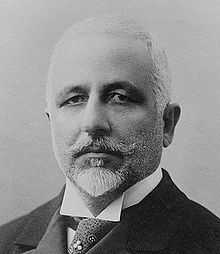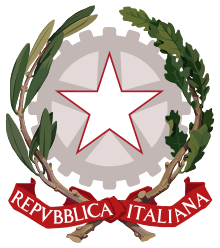Tommaso Tittoni
| Tommaso Tittoni | |
|---|---|
 | |
| 17th Prime Minister of Italy | |
| In office 12 March 1905 – 28 March 1905 | |
| Monarch | Victor Emmanuel III |
| Preceded by | Giovanni Giolitti |
| Succeeded by | Alessandro Fortis |
| Personal details | |
| Born | 16 November 1855 Rome, Italy |
| Died | 7 February 1931 (aged 75) |
| Political party | Liberal (Historical Right) |
Tommaso Tittoni (16 November 1855 – 7 February 1931) was an Italian diplomat, politician and Knight of the Annunziata.
Biography
Tommaso Tittoni was born in Rome. His father, Vincenzo, a tenant farmer on a large scale at La Manziana, had taken part in the defence of the Roman Republic under Giuseppe Garibaldi in 1849, was exiled by Pius IX, and re-entered Rome in 1870 through the breach of Porta Pia. Tittoni was educated first at Naples, and subsequently at Oxford and Liège.
He began his parliamentary career in the Chamber of Deputies for Civitavecchia in 1886, aligning himself with the right-wing. He resigned his seat in 1897, having been appointed prefect of Perugia. Three years later he went to Naples in a similar capacity, and in 1902 he entered the Senate.
When Giovanni Giolitti became premier for the second time in 1903, Tittoni became his Foreign Minister. He aimed at improving relations with Austria, and also tried to bring about a reconciliation with France. It was in fact under his auspices that French President Émile Loubet visited Rome. On the resignation of Giolitti in March 1905, Tittoni became interim Premier for a few days and remained in Alessandro Fortis's cabinet as Foreign Minister. His proposal to reduce the duty on Spanish wines in connexion with an Italo-Spanish commercial treaty aroused a storm of indignation among the agricultural classes and caused the fall of the cabinet on December 24, 1905, and although Fortis composed a new administration, Tittoni did not enter it.
A few months later he was appointed ambassador in London (March 1906), but in May, on the fall of Sidney Sonnino's ministry and the return of Giolitti to power, he was again summoned to the Consulta. He continued the policy of improving relations with Austria, which did not contribute to his popularity. After the annexation of Bosnia and Herzegovina, his imprudently worded speech at Carate created the illusion that Italy was to be compensated, perhaps by the cession of the Trentino, and the disappointment when nothing of the kind materialized greatly weakened his prestige. He remained in office until the fall of Giolitti in December 1909.
In April of the following year, he was appointed ambassador in Paris. When World War I broke out, in spite of his Triplicist policy he openly expressed himself in favour of Italian neutrality, and on Italy's entry into the war he was careful not to compromise himself with Giolitti's attitude. But he was not at his ease in the French capital, and in November 1916 he resigned from the Paris embassy. On the fall of the Orlando Cabinet in June 1919, the new Premier, Francesco Saverio Nitti, chose Tittoni as Foreign Minister and first delegate at the Paris Peace Conference, but the severe strain of the work told on his health and he was forced to resign in November. He was chosen president of the Italian Senate in December 1919, and soon after was appointed Italian delegate on the Council and Assembly of the League of Nations, but ill-health again forced him to relinquish the latter two appointments. He remained president of the Senate until January 1929.
After the March on Rome, Tittoni supported Mussolini's government and later became the first president of Royal Academy of Italy (28 October 1929 – 16 September 1930), the most important cultural institution of the fascist dictatorship. On 8 April 1923 he had received the supreme honour of the knighthood of the Annunziata by King Victor Emmanuel.
He died on 7 February 1931.
Notes
References
 This article incorporates text from a publication now in the public domain: Chisholm, Hugh, ed. (1922). "Tittoni, Tommaso". Encyclopædia Britannica (12th ed.). London & New York.
This article incorporates text from a publication now in the public domain: Chisholm, Hugh, ed. (1922). "Tittoni, Tommaso". Encyclopædia Britannica (12th ed.). London & New York.
| Wikimedia Commons has media related to Tommaso Tittoni. |
| Political offices | ||
|---|---|---|
| Preceded by Giulio Prinetti |
Italian Minister of Foreign Affairs 1903–1905 |
Succeeded by Antonino Paternò-Castello |
| Preceded by Giovanni Giolitti |
Prime Minister of Italy (acting) 1905 |
Succeeded by Alessandro Fortis |
| Preceded by Giovanni Giolitti |
Italian Minister of the Interior (acting) 1905 |
Succeeded by Alessandro Fortis |
| Preceded by Francesco Guicciardini |
Italian Minister of Foreign Affairs 1906–1909 |
Succeeded by Francesco Guicciardini |
| Preceded by Sidney Sonnino |
Italian Minister of Foreign Affairs 1919 |
Succeeded by Vittorio Scialoja |
| Preceded by Adeodato Bonasi |
President of the Italian Senate 1919-1929 |
Succeeded by Luigi Federzoni |
| ||||||||||
| ||||||||||||
|
.svg.png)

